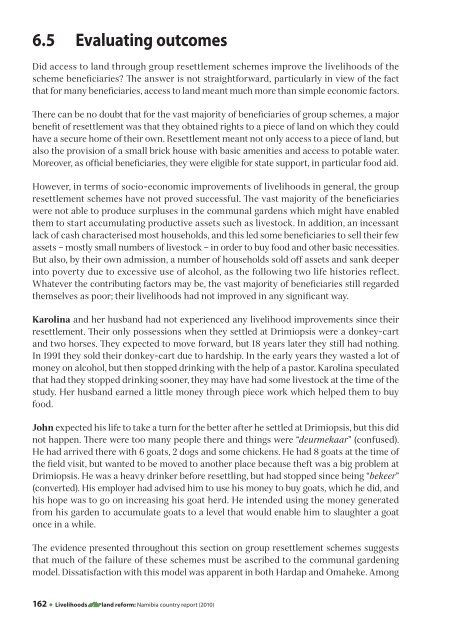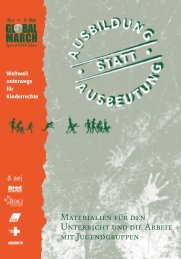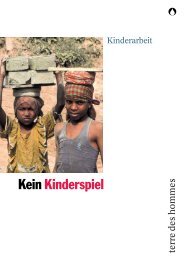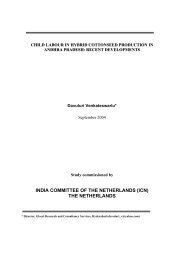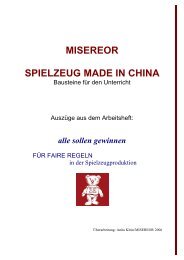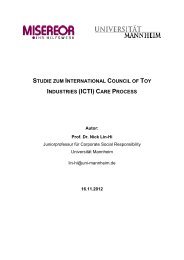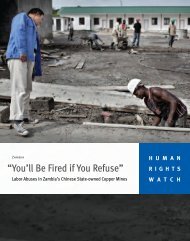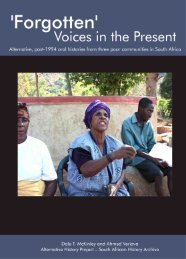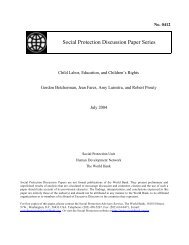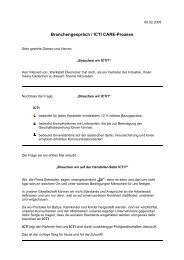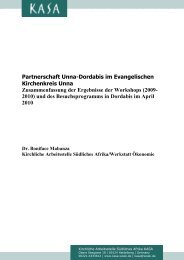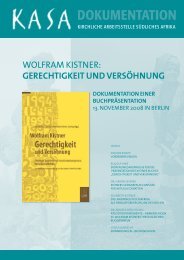Namibia country report
Namibia country report
Namibia country report
- No tags were found...
Create successful ePaper yourself
Turn your PDF publications into a flip-book with our unique Google optimized e-Paper software.
6.5 Evaluating outcomesDid access to land through group resettlement schemes improve the livelihoods of thescheme beneficiaries? The answer is not straightforward, particularly in view of the factthat for many beneficiaries, access to land meant much more than simple economic factors.There can be no doubt that for the vast majority of beneficiaries of group schemes, a majorbenefit of resettlement was that they obtained rights to a piece of land on which they couldhave a secure home of their own. Resettlement meant not only access to a piece of land, butalso the provision of a small brick house with basic amenities and access to potable water.Moreover, as official beneficiaries, they were eligible for state support, in particular food aid.However, in terms of socio-economic improvements of livelihoods in general, the groupresettlement schemes have not proved successful. The vast majority of the beneficiarieswere not able to produce surpluses in the communal gardens which might have enabledthem to start accumulating productive assets such as livestock. In addition, an incessantlack of cash characterised most households, and this led some beneficiaries to sell their fewassets – mostly small numbers of livestock – in order to buy food and other basic necessities.But also, by their own admission, a number of households sold off assets and sank deeperinto poverty due to excessive use of alcohol, as the following two life histories reflect.Whatever the contributing factors may be, the vast majority of beneficiaries still regardedthemselves as poor; their livelihoods had not improved in any significant way.Karolina and her husband had not experienced any livelihood improvements since theirresettlement. Their only possessions when they settled at Drimiopsis were a donkey-cartand two horses. They expected to move forward, but 18 years later they still had nothing.In 1991 they sold their donkey-cart due to hardship. In the early years they wasted a lot ofmoney on alcohol, but then stopped drinking with the help of a pastor. Karolina speculatedthat had they stopped drinking sooner, they may have had some livestock at the time of thestudy. Her husband earned a little money through piece work which helped them to buyfood.John expected his life to take a turn for the better after he settled at Drimiopsis, but this didnot happen. There were too many people there and things were “deurmekaar” (confused).He had arrived there with 6 goats, 2 dogs and some chickens. He had 8 goats at the time ofthe field visit, but wanted to be moved to another place because theft was a big problem atDrimiopsis. He was a heavy drinker before resettling, but had stopped since being “bekeer”(converted). His employer had advised him to use his money to buy goats, which he did, andhis hope was to go on increasing his goat herd. He intended using the money generatedfrom his garden to accumulate goats to a level that would enable him to slaughter a goatonce in a while.The evidence presented throughout this section on group resettlement schemes suggeststhat much of the failure of these schemes must be ascribed to the communal gardeningmodel. Dissatisfaction with this model was apparent in both Hardap and Omaheke. Among162 ● Livelihoods after land reform: <strong>Namibia</strong> <strong>country</strong> <strong>report</strong> (2010)


